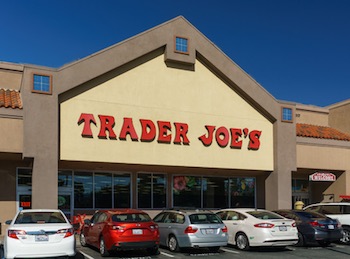
Trader Joe’s store in Santa Clarita, California.
A recent decision out of the Ninth Circuit Court of Appeals is a reminder that the Lanham Act’s reach extends to allegedly infringing activity occurring primarily or even wholly outside of the United States, provided plaintiffs can demonstrate a nexus with U.S. commerce.
Many grocery store-going Americans instantly recognize the name Trader Joe’s. The well-known American grocer, which operates hundreds of stores throughout the United States, gained a reputation for its low priced, high quality private label products and South Pacific-themed store design. The record indicted Trader Joe’s does not franchise its intellectual property or authorize others to sell its products. It does not operate stores or sell its products outside the United States, although court filings established that Canadian consumers regularly travel across the border to shop at Trader Joe’s stores located in northern Washington state.
The record in Trader Joe’s v. Hallatt reveals that in October 2011, staff members at the Bellingham, Washington Trader Joe’s noticed that a Canadian resident, Michael Norman Hallatt, was visiting the store several times per week and purchasing large quantities of Trader Joe’s products. Bellingham is located about twenty-five miles from the Canadian border and about sixty miles from Vancouver, British Columbia. When questioned about his frequent trips, Hallatt indicated that he drove the purchased Trader Joe’s products across the Canadian border, where he would distribute them to Canadian consumers. Specifically, Hallatt operated a store, Pirate Joe’s, where he resold, at substantially inflated prices, Trader Joe’s products he had purchased in Washington. Trader Joe’s demanded that Hallatt stop reselling its products in Canada, but Hallatt refused, driving to other Trader Joe’s locations and allegedly paying third parties to buy Trader Joe’s goods on his behalf. All told, court filings indicated Hallatt purchased over $350,000 worth of Trader Joe’s products with the intention of reselling them, at higher prices, in Canada.
Trader Joe’s sued Hallatt (d/b/a Pirate Joe’s) for trademark infringement in the Western District of Washington, invoking the court’s federal question and supplemental jurisdiction. Trader Joe’s alleged that: (1) Hallatt misled consumers into falsely believing Pirate Joe’s was authorized or approved by Trader Joe’s; (2) utilized a confusingly similar “South Pacific” trade dress for his Pirate Joe’s store; (3) displayed Trader Joe’s trademarks in connection with the sale of products at Pirate Joe’s; and (4) resold Trader Joe’s products without authorization and without adherence to Trader Joe’s’ strict quality control practices. Trader Joe’s claimed Hallatt’s behavior diluted its trademarks, confused consumers, and damaged Trader Joe’s reputation by associating it with high price, lower quality products. Trader Joe’s sought damages and to permanently enjoin Hallatt from reselling its goods or using its trademarks in Canada.
The District Court dismissed Trader Joe’s’ federal claims for lack of subject matter jurisdiction, concluding that the Lanham Act did not reach Hallatt’s Canadian conduct. Trader Joe’s filed a motion for reconsideration, arguing that the extraterritorial scope of the Lanham Act was a merits question that did not implicate the court’s subject matter jurisdiction. The district court denied the motion and entered final judgment against Trader Joe’s in late 2013. Trader Joe’s appealed the dismissal to the Ninth Circuit.
In late August 2016, the Ninth Circuit reversed the dismissal of Trader Joe’s’ Lanham Act claims, holding that the extraterritorial reach of the Lanham Act raises a question relating to the merits of a trademark claim, not as to whether the federal courts has subject matter jurisdiction. The Ninth Circuit determined that Trader Joe’s complaint alleged a nexus between Hallatt’s conduct and American commerce sufficient to warrant extraterritorial application of the Lanham Act.
In its analysis the court explained that the U.S. Supreme Court had previously articulated a two-step framework for determining whether any statute, including the Lanham Act, reaches foreign conduct in the 2016 case RJR Nabisco, Inc. v. European Community (“RJR”). After RJR, courts first inquire “whether the statute gives a clear, affirmative indication that it applies extraterritorially.” If the first inquiry is answered in the affirmative, courts then consider “the limits Congress has (or has not) imposed on the statute’s foreign application.”
With respect to the Lanham Act, the Supreme Court in Steele v. Bulova Watch Co. (1952) held that the Act’s “use in commerce” element and broad definition of “commerce” clearly indicate Congress’s intent that the Act apply extraterritorially. The Ninth Circuit was satisfied by Trader Joe’s’ allegations that Hallatt’s conduct, while primarily concentrated in Canada, nevertheless impacted American commerce in a manner sufficient to invoke the Lanham Act’s protections.
Subject Matter Jurisdiction
The Ninth Circuit determined that the “use in commerce” element of Lanham Act claims under sections 32 and 43(a) is not connected to the Lanham Act’s jurisdictional grant in 15 U.S.C. § 1121(a). As such, “use in commerce” is a non-jurisdictional restriction, and the “use in commerce” and “commerce” language as it appears in the Lanham Act derives from Congress’s broad powers to regulate interstate and foreign commerce under the Constitution’s Commerce Clause. In other words, “use in commerce” delineates a substantive ingredient of a Lanham Act claim for relief, but does not affect federal court subject matter jurisdiction. Subject matter jurisdiction refers to a court’s fundamental power to a hear a case, which for purposes of the Lanham Act, is a question separate and apart from whether a plaintiff’s allegations entitle them to relief.
Limits on the Lanham Act’s Extraterritorial Application
The Lanham Act applies to “all commerce which may lawfully be regulated by Congress.” 15 U.S.C. § 1127. The question, then, becomes to what extent foreign activities may be swept into the Act’s reach pursuant to this grant of authority.
Under Ninth Circuit case law, the Lanham Act will apply extraterritorially if:
- The alleged violations impact American foreign commerce;
- Their impact is sufficiently great as to create a cognizable injury to plaintiffs; and
- An American court would be justified in asserting extraterritorial authority after balancing American interests in and links to American foreign commerce with the interests of the relevant foreign nation(s) (i.e., international comity).
The Ninth Circuit first articulated its test in Timberlane Lumber Co. v. Bank of America National Trust & Savings Ass’n (1976), where it was applied to antitrust law’s Sherman Act. The Ninth Circuit later extended Timberlane’s test to the Lanham Act in Wells Fargo & Co. v. Wells Fargo Express Co. (1977). Although Timberlane refers to the impact on “American foreign” commerce, courts regularly apply the Lanham Act to foreign conduct impacting domestic commerce.
A plaintiff may be able to satisfy Timberlane’s first and second prongs by alleging that infringing goods, though sold initially in a foreign country, subsequently flowed into American domestic markets. However, even where a plaintiff does not allege infringing goods have trickled back into the United States, they may be able to argue for extraterritorial application of the Lanham Act by demonstrating that the foreign activity has “some effect” on American commerce.
Trader Joe’s argued that while Hallatt’s conduct may not have resulted in Trader Joe’s products flowing back into the United States, his activities in Canada harmed Trader Joe’s’ reputation and decreased the value of its American-held trademarks. One potential hurdle to Trader Joe’s’ argument is the so-called “first sale doctrine,” that the resale of a legitimate product by a lawful purchaser of that product does not result in trademark infringement or unfair competition. To avoid application of the first sale doctrine, Trader Joe’s argued that Hallatt transported and sold Trader Joe’s goods without proper quality control measures or recall practices. The Ninth Circuit has held a quality control theory of infringement may be cognizable under the Lanham Act, notwithstanding the first sale doctrine, because selling or otherwise distributing products that do not meet a trademark holder’s quality control standards can have the result of devaluating a mark by tarnishing a producer’s image. Trader Joe’s asserted that poor quality control standards (such as food spoliation) could impact American commerce and reduce the value of its trademarks if, for example, consumers were to become ill and word of their illness made it to the U.S. Trader Joe’s also argued, among other things, that because Hallatt sold Trader Joe’s goods at higher prices, consumers may mistakenly associate Trader Joe’s with overpriced goods.
In other cases, courts have held that reputational harm can impact American commerce, and that a defendant’s conduct is actionable where it is likely to cause future harm to a plaintiff. Further, because false endorsement is an actionable harm under the Lanham Act, Hallatt’s attempts to pass off Pirate Joe’s as an authorized retailer could give rise to a claim for relief.
Lastly, the Ninth Circuit determined that Hallatt’s domestic economic activity – purchasing Trader Joe’s products in the United States and hiring third parties to do so on his behalf – weighed in favor of applying the Lanham Act to Hallatt’s conduct. Because Hallatt sourced his goods from the United States, he could not argue that all of the relevant acts occurred abroad, which in some cases may be sufficient to justify a determination that injury in the United States is unlikely. As a result, Trader Joe’s satisfied the first two Timberlane prongs.
With respect to the third Timberlane prong – international comity – the court also determined that the facts of the case justified extraterritorial application of the Lanham Act. In assessing international comity, the Ninth Circuit weighs seven factors:
- the degree of conflict with foreign law or policy;
- the nationality of the parties and the locations or principal places of business of corporations;
- the extent to which enforcement by either country can be expected to achieve compliance;
- the relative significance of effects on the United States as compared with those elsewhere;
- the extent to which there is explicit purpose to harm or affect American commerce;
- the foreseeability of such effect; and
- the relative importance to the violations charged of conduct within the United States as compared with conduct abroad.
In discussing the various factors, the Ninth Circuit highlighted Trader Joe’s’ Canadian registrations for its marks, and noted there were no other pending adversarial proceedings between Trader Joe’s and Hallatt in Canada. Although Trader Joe’s is an American business, its trademarks are well-known in Canada. Furthermore, while Hallatt was Canadian, the record established his lawful permanent resident status in the U.S., which the Ninth Circuit determined “subjects him[] to the laws of” the U.S. Furthermore, an American-issued injunction would effectively halt Hallatt’s operation, because an essential part of his commercial venture takes place in the United States, where he sources his goods.
Conclusion
Plaintiffs advocating for extraterritorial application of the Lanham Act must allege a nexus between a defendant’s foreign conduct and American commerce sufficient to state a Lanham Act claim. This may be accomplished where a plaintiff establishes probable reputational harm or a decrease in the value of its American-held intellectual property. A court must also be satisfied, after evaluating any potential conflict with another nation’s sovereign authority, that it is justified in applying the Lanham Act. Whether and to what extent the Lanham Act may be applied extraterritorially is a merits based question, but according to this decision, does not implicate a court’s subject matter jurisdiction.
Ultimately, the facts of any given case will dictate how sympathetic a court is likely to be to a plaintiff’s allegations of harm resulting from conduct that is exclusively or substantially foreign in nature. Trader Joe’s makes clear, however, that infringing goods need not make their way to U.S. soil in order for a plaintiff to demonstrate that harm is likely, and a plaintiff need not offer a good or service in a particular foreign nation provided they can show consumers nevertheless recognize their brand or a defendant’s conduct is likely to tarnish established goodwill.

![[IPWatchdog Logo]](https://ipwatchdog.com/wp-content/themes/IPWatchdog%20-%202023/assets/images/temp/logo-small@2x.png)

![[Advertisement]](https://ipwatchdog.com/wp-content/uploads/2024/04/Patent-Litigation-Masters-2024-sidebar-early-bird-ends-Apr-21-last-chance-700x500-1.jpg)

![[Advertisement]](https://ipwatchdog.com/wp-content/uploads/2021/12/WEBINAR-336-x-280-px.png)
![[Advertisement]](https://ipwatchdog.com/wp-content/uploads/2021/12/2021-Patent-Practice-on-Demand-recorded-Feb-2021-336-x-280.jpg)
![[Advertisement]](https://ipwatchdog.com/wp-content/uploads/2021/12/Ad-4-The-Invent-Patent-System™.png)







Join the Discussion
One comment so far.
Jay Wells
September 25, 2016 06:14 pmNo mention of Bayer v. Belmora (the FLANAX case)?